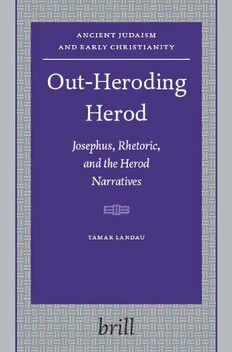
Out-Heroding Herod: Josephus, Rhetoric, and the Herod Narratives (Ancient Judaism and Early Christianity 63) PDF
281 Pages·2006·2 MB·English
Most books are stored in the elastic cloud where traffic is expensive. For this reason, we have a limit on daily download.
Preview Out-Heroding Herod: Josephus, Rhetoric, and the Herod Narratives (Ancient Judaism and Early Christianity 63)
Description:
The book examines the parallel accounts of the rise, reign and fall of King Herod of Judea in the works of Flavius Josephus: Bellum Judaicum 1.204-673 and Antiquitates Judaicae 14-17. The main questions considered here concern the very existence of two separate accounts of the same historical period, the significant rhetorical differences between them, and the ways in which Josephus portrays two different images of the same man: Herod of Judea. Also under consideration here are literary and historiographical questions regarding the structure of the narratives, the implementation of rhetorical tools, the historian’s authorial voice, and the relations with earlier sources and other examples of Jewish, Greek and Roman historiography. The two Herod narratives clearly demonstrate Josephus’ meticulous implementation of rhetorical tools and dramatic devices, mostly influenced by Greek historiography. A few Roman echoes and a deeper level of Jewish assumptions appear as well. Josephus’ careful composition and highly charged rhetoric is here explained by using the modern theory of narratology. Reading the Herod narratives in light of narratological concepts like focalization, order and the narrator’s voice reveals new angles for understanding Josephus’ method as a historian and new insights concerning the image of Herod and the rhetorical means used by Josephus in portraying him.
See more
The list of books you might like
Most books are stored in the elastic cloud where traffic is expensive. For this reason, we have a limit on daily download.
